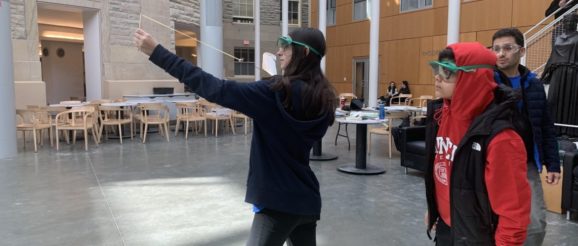Encouraging Innovation and Imagination at Cornell’s Science Olympiad Invitational

At the crack of dawn on Saturday, middle and high school students from across the Northeast piled into the Physical Sciences Building carrying Rube Goldberg machines — machines intended to perform a simple task in an intricate way — as well as airplanes, bottle rockets and vehicles powered by mouse traps.
Over the weekend, Cornell’s Science Olympiad club, which first hosted the event in 2015, opened its doors to young students for its annual invitational tournament for Science Olympiad, an organization dedicated to instilling teamwork and curiosity in STEM for the next generation of scientists.
Throughout the competition, Cornell Science Olympiad members sprawled across Central Campus, ready to judge students’ performances in the events.
Anticipation electrified the air, as the students prepared to test the machines they had been working on for months, designed to showcase their knowledge in subjects ranging from forensics and toxicology to food science and astrophysics.
The event’s categories included written tests, lab activities and building contraptions, where students worked in groups of two or three to accomplish science-related tasks while competing against students from other middle schools.
At the building events, students brought in pre-built devices to be tested against students from other teams. In one such event, called “Mousetrap Vehicle,” competitors constructed a small vehicle powered by mouse traps to reach a target distance as quickly as possible.
For middle schoolers like Thomas, a seventh grader at Howard L. Goff Middle School, the excitement of learning and competition outweighed the intense time commitment and dedication required to prepare for the tournament.
“I didn’t know many of these things before,” Thomas said. “There was a lot of stuff to figure out. It was a little stressful at the beginning, but the team has been very welcoming. We practice a lot and it’s a really fun environment.”
The competition also included events with written tests on various subjects, including food science, fossils, and heredity.
Activity or lab events, like “Experimental Design,” required competitors to perform tasks using provided materials during a limited time, usually without prior knowledge of the specific task.
This year, the experimental design event tested the students’ knowledge of foundational physics, and their ability to apply this knowledge using scientific inquiry skills such as forming and testing hypotheses, gathering observations and analyzing data.
Many competitors of this year’s tournament cited their experiences in Science Olympiad as integral to developing their desire to pursue a scientific field.
“I didn’t really know what I wanted to do a while ago, but now I’m sure that I want to go into a STEM field because I really enjoy doing these Science Olympiad events,” said Akkhil Morkanda, co-captain of the Howard L. Goff Science Olympiad team. “I personally enjoy engineering events like Boomilever and Elastic Gliders. It requires a lot of problem solving and thinking.”
Participants lined up in the Physical Sciences Building to test their Rube Goldberg machines.
Noel Picinich ’20, co-president of Science Olympiad at Cornell and a former competitor in high school Science Olympiad tournaments, enjoys running the annual tournaments. She sees it as an opportunity to give back to the organization that fostered her own passion for science, and impact the next generation of scientists.
“It’s such a great opportunity to give back to something that was such a big part of our lives when we were younger,” Picinich said. “I think it shaped a lot of my career goals and my perspective on STEM, and now we get to provide that same experience to other young science competitors.”
The final standings were announced at the award ceremony in Kennedy Hall. Paul J. Gelinas Junior High School received first place, with Harlan Rowe Middle School in second place and Howard L. Goff Middle School in third.
Although certain schools came out on top, students still expressed enjoyment competing in the annual olympiad.
“Biology is really fun to me,” said Jasmine, a Brooklyn Amity School middle school student. “You can’t help but feel interested, and feel blessed, even. It really excites me, thinking about how unique everything on our planet is. Everything has a life. It’s really beautiful.”
